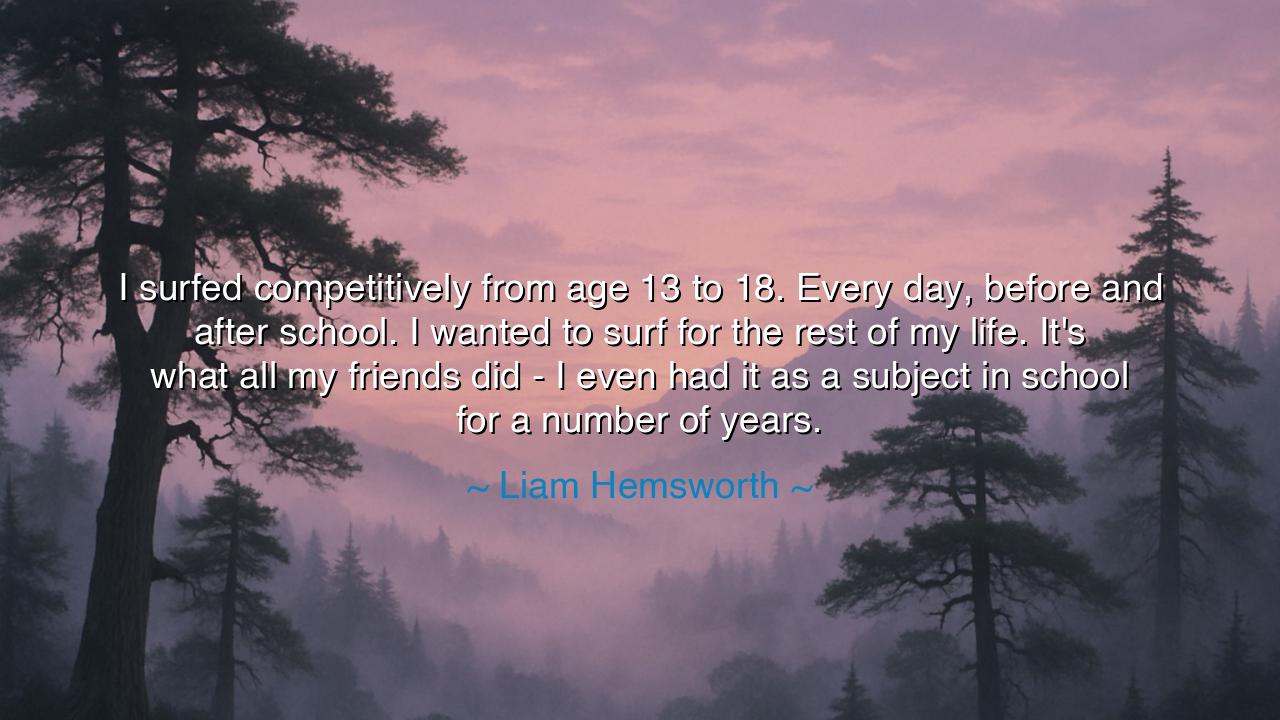
I surfed competitively from age 13 to 18. Every day, before and
I surfed competitively from age 13 to 18. Every day, before and after school. I wanted to surf for the rest of my life. It's what all my friends did - I even had it as a subject in school for a number of years.






"I surfed competitively from age 13 to 18. Every day, before and after school. I wanted to surf for the rest of my life. It's what all my friends did - I even had it as a subject in school for a number of years." These words spoken by Liam Hemsworth reveal a deep truth about the power of passion, dedication, and the pursuit of a craft that becomes a way of life. Hemsworth’s reflection on his years spent surfing as a young man highlights the role of discipline, joy, and commitment in pursuing one’s dreams, even at a tender age. Surfing was not just a sport for him—it was a calling, an integral part of his identity that shaped not only his youth but his approach to life.
In the ancient world, great warriors, philosophers, and thinkers often found their identity in the pursuit of a singular passion. Consider the great Greek hero, Odysseus, whose journey was not only about physical conquest but about the inner struggle to return home, to reclaim his sense of self. Much like Hemsworth’s love for surfing, Odysseus’s journey was a commitment that defined his life, a path that required not just skill, but a relentless pursuit of a greater purpose. For Odysseus, every action, every challenge he faced, was in pursuit of a life goal, just as Hemsworth’s devotion to surfing defined his youth. The dedication and persistence in both these examples show us that our passions are what shape our journey, driving us toward excellence and self-discovery.
In Hemsworth’s case, the surfing he describes—done every day, before and after school—speaks to the discipline required to master something. The same can be said of the ancient philosophers like Aristotle, who believed that the pursuit of virtue required constant attention, effort, and practice. Aristotle taught that excellence is not an accident, but a result of habit and dedication. Just as Hemsworth didn’t just surf casually, but as a committed competitor, Aristotle believed that virtues such as courage, wisdom, and temperance were cultivated through consistent practice, becoming part of one's character over time. Hemsworth’s reflection emphasizes that becoming great at something, whether it’s a sport or a life pursuit, is about immersing oneself in it, giving it time and effort, and aligning it with one’s values.
The idea that Hemsworth had surfing as a subject in school reveals how education and passion can intersect. In the ancient world, education was not only about books and theory but about practical wisdom and physical training. Spartan warriors, for example, were taught not only to read and write but to fight, train, and live in a disciplined way. Their education was about creating well-rounded individuals who understood their role in the greater community and who could excel in various aspects of life. Hemsworth’s story, much like the Spartans, shows that formal education does not have to be limited to traditional subjects. When we combine our passions with learning, we are creating the foundation for a fuller, more integrated life.
What Hemsworth’s experience also teaches us is that the pursuit of passion is often shaped by our surroundings and the community we grow up in. Hemsworth mentions that it wasn’t just him but his friends who shared this passion for surfing. The community—the shared experiences with others—nourished and strengthened his commitment. This aligns with Aristotle’s belief in the importance of community and friendship. In his work Nicomachean Ethics, Aristotle discusses the idea that virtue is cultivated not in isolation but in relationship with others. Hemsworth’s connection to his friends in the world of surfing made it not just a personal passion but a communal journey, elevating their shared experiences and making their pursuit even more meaningful.
The lesson we take from Liam Hemsworth’s reflection is that passion is something that must be cultivated through dedication, practice, and a commitment to personal growth. Just as surfing shaped Hemsworth’s youth and even became an academic pursuit, we too must find the thing that drives us and commit ourselves to it, whatever it may be. Whether it’s in sports, art, or intellectual endeavors, the power of focus and discipline is essential for growth. Yet, it is not just the practice itself, but the community we engage with, the people who share our passions, that can amplify our strength and help us thrive.
In practical terms, this means we must identify our passions and create environments where we can nurture them. Just as Hemsworth surrounded himself with friends who also surfed, we must build connections with others who support our ambitions. Let us recognize that education and growth extend beyond the classroom or professional spaces, and that passions, when deeply connected to our lives, can become sources of endless motivation and purpose. Whether it is through formal avenues like school or informal ones like our communities, let us continue to engage in the things that make us feel alive, and in doing so, live lives of meaning and excellence.
Finally, like Hemsworth, we must learn to immerse ourselves in what we love, to be willing to dedicate time and effort, just as the ancients did in their pursuit of virtue, knowledge, and greatness. By living fully in alignment with our passions, we can forge a path that is not only deeply satisfying but also truly transformative, both for ourselves and those around us. Surfing, like all passions, is more than just a skill—it is a journey, a calling, a way of life. Let us find our own surfing waves and ride them with courage, persistence, and joy.






AAdministratorAdministrator
Welcome, honored guests. Please leave a comment, we will respond soon